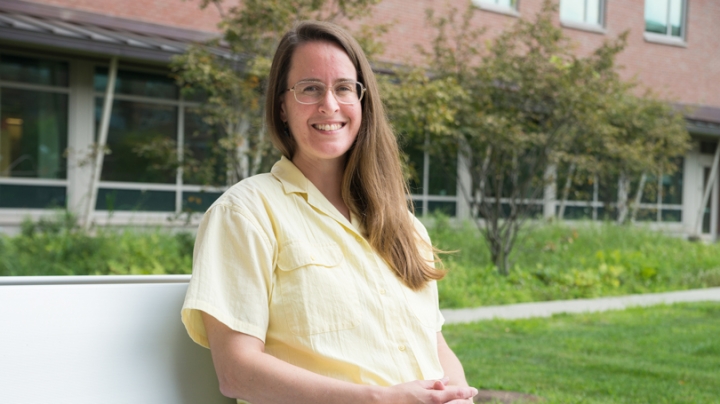This is the third in a series of profiles of the 10 new endowed professors in the arts and sciences.
Kathryn Cottingham, the Dartmouth Professor in the Arts and Sciences
Kathryn Cottingham joined the Department of Biological Sciences 18 years ago. Chair of the department, she is also a professor and co-chair of the ecology and evolutionary biology graduate program and a fellow of the Ecological Society of America. She is an expert on lake plankton and has collaborated with colleagues at the Geisel School of Medicine to study human health, including, most recently, the health effects of arsenic.
Why Dartmouth:
My favorite days are the days in the field with my students when we can see plankton in the water and think about why they’re there now and why they weren’t last week. I get to work with the best undergraduates in an intimate, hands-on situation, and I have graduate students and postdocs and am able to conduct a full-fledged research enterprise. There are very few places in the world where you have that best of both.
On teaching:
I teach two courses for undergrads who are at that transition between introductory and advanced work: biostatistics, which is the foundation for what we do as researchers, and a course called “Methods in Ecology,” where every week we go to a new system and practice the scientific method. I’m giving the students practical skills that they can use in any research program. It’s gratifying. And in my lab, lake ecology work is incredibly accessible. We’re in our 11th year of collecting data on Gloeotrichia echinulata from Lake Sunapee—the longest record in the world for a population-level study of cyanobacteria. This project began in 2005 as part of a student honors thesis by Cayelan Carey ’06, and we’re still going.
Why study lakes:
I love how studying lakes links physics, lake chemistry, and lake biology. I ask questions at the intersections of all these disciplines. We think Gloeotrichia echinulata is very responsive to changes in climate, so increases in this species may be a harbinger of things to come.
Professor Kathryn Cottingham and her students have been studying Gloeotrichia echinulata, plankton from Lake Sunapee in New Hampshire, for more than a decade. (Image courtesy of Sam Fey)
Current research interests:
I spend a lot of time thinking about lakes and ecology, and a lot of time thinking about human health. I’ve had two projects with collaborators at Geisel. The first happened serendipitously—a grad student of a colleague realized that the bacterium that causes cholera spends a lot of its life cycle hanging out on plankton. She brought Ron Taylor from Geisel and me together on that and we had a five-year partnership, and many papers are still to be written from that study. I’ve also been working with Margaret Karagas, also from Geisel, to assess the effects of human exposure to arsenic. Now I’m starting to look for the next big project, and I want to think about the effects of climate change on human health and ecological health simultaneously—trying to bring together these two worlds I’ve been living in for the past decade. That’s the vague outline for a 10-year plan of where I would like to go.
What being named to this professorship means:
It’s a nice recognition of what I’ve been trying to do across the board in teaching, research, and service to the institution. And it comes with a commitment to continue to do those kinds of things across the arts and sciences—to stick my head up from biology once in a while and see what else is there.
The Endowed Chairs
Since 1787, Dartmouth has recognized its top faculty with named professorships. These chairs—traditionally supported through endowed gifts from alumni, family, and friends of the College—honor faculty whose scholarship, teaching, and service exemplify Dartmouth’s core mission.
“Endowed professors reflect the best of Dartmouth,” says Dean of the Faculty Michael Mastanduno. “These scholars are not only at the top of their respective fields—they are generous and committed teachers and outstanding citizens of the College community.”
This year, 10 members of the Faculty of Arts & Sciences have been appointed to endowed chairs. In addition, the Tuck School of Business appointed Praveen Kopalle the Signal Companies’ Professor of Management; and Rahul Sarpeshkar joined the faculty this year as the inaugural Thomas E. Kurtz Chair in the William H. Neukom Academic Cluster in Computational Science, with a primary appointment at Thayer School of Engineering.

